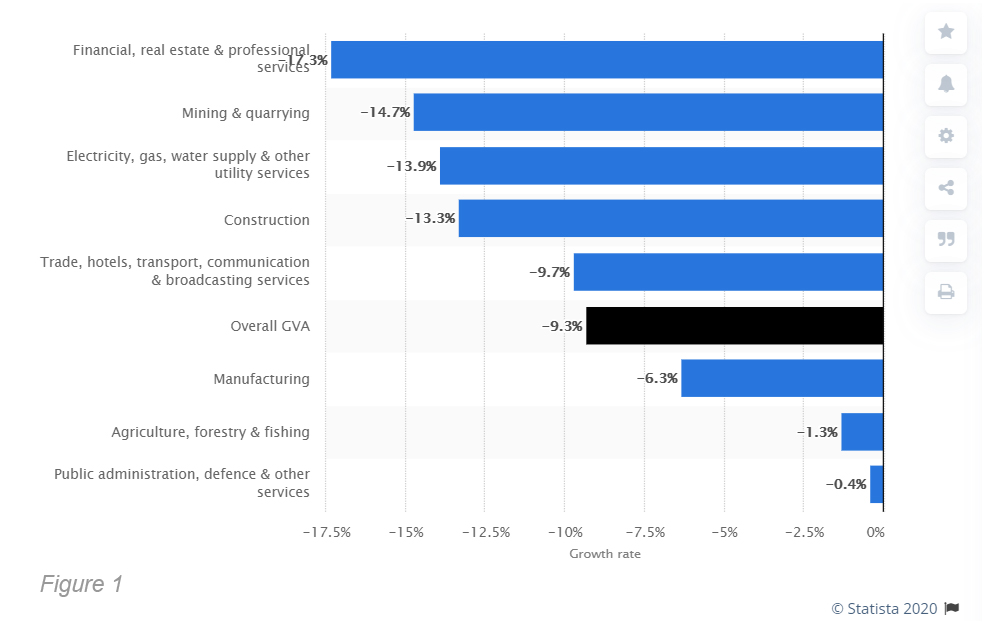It’s hard to open the newspaper (if you are still getting one that is) and read anything other than the impact of COVID on – well, on everything. Last week, we wrote about how the virus has led to the stratospheric Boom in Zoom. Today, we look at the other side – the decline of commercial real estate. The two (Zoom and commercial real estate that is) seem to be inversely proportional to each other – the very reasons that cause one to rise, cause the other to fall.
Here’s a look at some numbers.
According to Cushman & Wakefield report, office space absorption across top 8 property markets in India has declined 30% sequentially to 16.75 million sq. ft in Q1. This is in line with the estimation by global property consultant JLL that net leasing of office space could decline by up to 14% this year to over 40 million sq. ft across seven major cities (Delhi-NCR, Mumbai, Bengaluru, Chennai, Hyderabad, Pune and Kolkata).
The scenario was looking grim to even before COVID. The lockdown and its impact on the economy seems to have pretty much sounded the death knoll – not just in India, but across the world. As per the estimated economic impact (sector-wise) from COVID-19 on India’s GVA April-June 2020, real estate is among the hardest hit sector, seeing a drop of 17.3% along with Financial & Professional services (in fig 1).

A similar hit has been reported in the US and the UK. A Moody’s Analytics report forecasted a pandemic-prompted recession that would cause GDP to contract by 4% over a year and a half, on different asset classes and geographies in the commercial-real-estate business across the United States (in fig 2). It is estimated that there may be increases in vacancy (of commercial paces) and decreases in rent.

The UK too has been given a similar projection by VOX EU – it states that the probability of negative impact by the Covid19 on the sales of real estate sector (in sales) would be >30% over the next year (in fig 3).

It is clear that the lock-down and social distancing imposed to keep a check on the spreading pandemic has affected the cashflow. But what’s worrying is that this temporary change in our living (and working) style may not really be temporary anymore and could lead to a permanent change that may directly impacts (commercial) real estate. JLL listed out few long-term impacts in its report on COVID-19: Global Real Estate Implications:
- Increase in remote working and a greater focus on health, well-being and productivity
- Change in retail behaviour with the normalisation of online grocery shopping
- Change in perception of travel and renewed emphasis on sustainable practices.
- Increased integration of technology, particularly PropTech and MedTech, impacting all aspects of life and business
That said, this pandemic could definitely affect the demand for real estate assets as events continue to be cancelled, offices remain shut and travel restrictions continue to be imposed.
As the saying goes – one man’s loss is another man’s gain – more remote first companies will be borne out of this global lockdown. With millions of people working from home, the home-office work style may become the new work-trend post-Covid19.
According to Buffer’s annual report (2019)- The State of Remote Work, 99% of its (global) respondents wanted to work remotely or at least for some time in their career (fig 4). This is an indication that perhaps remote working is here to stay.

While not so common in India, remote working has been popularly practised (and successfully so) in countries like the U.S. and the UK. Before the global lockdown began, Forbes had estimated that by 2020, 50% of the UK workforce will work remotely. The U.S. also saw an increase in the same by 159% in 2019. At present, over 40 nations have enforced lockdown and thus resorting to remote working; this could be the largest remote work experiment.
Companies are now coming around to realising that remote working is not just a trend, but a way of working and can have huge benefits. FlexJobs’ annual survey found that 65% of respondents are more productive in their home office than at a traditional workplace. It has also been found that 60% of top 20 companies listed in the annual World’s Best Workplaces list have an active remote working policy.
In India, almost 4-5 million Indian employees have been working from home since its lockdown in mid-March 2020. As lockdown extends, so does remote working. Perhaps, this work-culture could be the new normal in India. And this enforced remote working may actually be the push-button for organizations to consider it as a long-term solution. Remote work is the new normal.











![Best Universities in New Zealand for International Students [2025 Rankings]](https://tcglobal.com/wp-content/uploads/2025/09/Best-Universities-in-New-Zealand-for-International-Students-2025-Rankings-600x338.png)